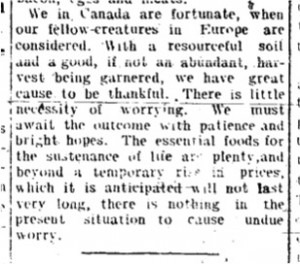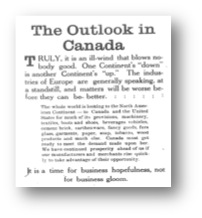When Britain declared war on Germany on 4 August, the Canadian Grocer predicted a general rise in the price of foodstuffs. Foods that were imported from within the war zone, such as sugar, beans, nuts, cream of tartar, Bosnian prunes and French peas, would increase in price and decrease in availability. Additionally, domestic products such as wheat and flour had already seen an increase in price by the first week of August. After discussing the various increases in prices, and the reasons behind those increases, the Canadian Grocer reminded readers that Canadians were fortunate when compared to those in Europe. Canada would have enough sustenance throughout the war, even if rationing had to be implemented later on. It was evident that there was no need for the Canadian public to worry about foodstuff at this point in the war.
(“Soaring Food Prices,” Waterloo Chronicle Telegraph, 13 August 1914; “Prices for Foodstuffs Increasing,” Waterloo Chronicle Telegraph, 13 August 1914; “How Prices Have Soared in Ontario,” Waterloo Chronicle Telegraph, 13 August 1914; “War A Check On Commerce,” Elmira Signet, 20 August 1914; “No Shortage of Food,” Waterloo Chronicle Telegraph, 27 August 1914)
Excerpt from “Soaring Food Prices” (Waterloo Chronicle Telegraph, 13 August 1914)

